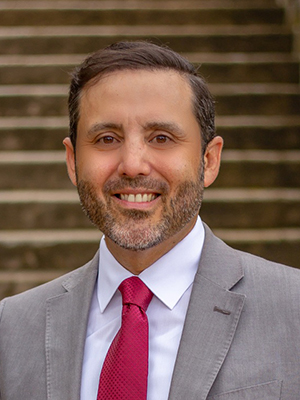First Things First Program Offers Students a Debt-free First Year

Enrollment Services Vice President
Schreiner University
As concerns about college affordability persist, Schreiner University is pioneering a novel approach to getting needy new students off to a good start: the first year is on the house (mostly), and they don’t even have to leave home.
The small, private, liberal arts school in Kerrville has created “first-year campuses” in El Paso, Brownsville and Mission. Students there take full academic loads — 15 credit hours each semester — at a fraction of the cost of attending the main campus.
“The first year is crucial for college success,” says Larry Cantu, enrollment services vice president. And that means financially as well as scholastically.
The idea behind Schreiner’s initiative is to help students make it to their second year of college without incurring a big financial burden at the outset. A financial aid package of scholarships, grants and some loans awaits those who complete the first year successfully and graduate in four years.
To be eligible for the innovative program, qualifying students and/or their families must be able to provide $8,000, the bulk of which, however, is largely covered by federal grants. This sum covers tuition and fees, books, a laptop computer and three or four visits to the Kerrville campus.
Their expected family contribution, a key component of federal financial aid calculation, must either be low or zero. Those levels are a prerequisite for federal Pell Grants, for which applicants must qualify. Those who receive them lower their out-of-pocket costs to about $2,000, Cantu explained.
As with their peers at the main campus, applicants are evaluated on high school class rank, grade point average (3.25 minimum) and college entrance exam scores, but also on either an interview, written essay or video presentation. Students may not claim more than 30 hours of dual-credit courses.
Instruction is mainly provided online, supplemented by in-person directors who teach some subjects.
Program enrollment is capped at 75 students. A total of 42 were accepted last fall for the inaugural year – 13 each in El Paso and Brownsville and 16 in Mission. As of early August, 49 are enrolled for this fall: 19 in El Paso, 18 in Brownsville and 12 in Mission. Cantu is optimistic all the slots will be filled this year.
Cantu and Schreiner University President Charlie McCormick began formulating plans for the program more than 18 months ago. It was a response to the many applicants and interested students who couldn’t afford Schreiner’s average annual cost of $40,000 per student or couldn’t leave home after high school.
“We were seeing a student population that wanted to be here but couldn’t,” Cantu says.
Cantu says school officials took their proposal to community leaders to garner support. The university hasn’t conducted outside fundraising for the program yet, although that may change.
The first-year program doesn’t generate net revenue, according to Cantu, but its price point allows it to be largely self-sustaining. Cantu says it’s competitive with comparable public universities in the three communities.
According to the Texas Higher Education Coordinating Board, Schreiner’s program appears to be unique, although similar efforts are underway.
For example, the eight schools in the Texas State University system are partnering with a higher education nonprofit organization to offer a “Freshman Year for Free.” It’s aimed at entering students who are working or did not have access to college-credit courses in high school. The program doesn’t charge tuition or materials costs for the freshman-level online courses offered, but the students are not actually enrolled in an institution. Upon completion, they can take tests to obtain college credit from individual schools.
Cantu says larger public universities have expressed interest in the program — “nothing huge yet,” but other college presidents have been in touch.
“It’s a great model,” he says. “Schools should use it.” FN
Learn more about Schreiner’s first-year campuses.


